
At the end of 1992, when the marriages of her children, Prince Charles, Prince Andrew and Princess Anne all dissolved and Windsor Castle caught fire, Queen Elizabeth II alluded to the title of John Dryden’s poem Annus Mirabilis (“Year of Miracles”) and referred to the year as an annus horribilis (“horrible year”).
As H.R.H. the Queen of England riffed on Dryden’s coinage, so shall I riff upon hers. If I had to summarize the year between 2008 in a quick soundbite, I would use the pseudo-Latin coinage Annus Assrocketis, as in “Year of Assrockets”.
Assrockets and Opportunities
A little bit over a year ago, I wrote an article titled Assrockets and Opportunities explaining why I was leaving my job as Tucows’ Technical Evangelist, a relatively safe, secure and cushy job – one that its CEO Elliot Noss said “fit me like a glove” — for a startup in the rather iffy social software space.
I had been feeling a little bit restless for a little while, but that restlessness alone wasn’t enough to make me take the leap. Strangely enough, it took a video of a guy sticking a bottle rocket up his butt and an observation made by Charles Follymacher in the blog The War on Folly. Assrockets and Opportunities summarized how the video and Follymacher’s blog entry inspired me to change jobs.
As a quick refresher, here’s the video. Be advised that it may not be safe to view at your workplace, as it shows a young man’s bare bottom and a bottle rocket stick being inserted into said bottom. It also has a lot of crude vernacular that young men are wont to use. That being said, I still think it’s one of the funniest internet home videos of all time and it still makes me laugh out loud, even after hundreds of viewings:
Still the funniest video of all time.
In response to this video, Follymacher, a person of colour (I myself prefer the term “force of darkness” – it has a little more oomph) wrote a hilarious and insightful observation titled why White people rule this age. The relevant excerpts appear below:
…I’m once again reminded why White people rule the globe. It’s not a new idea, just feeling compelled to state it once more, this time without feeling: they run the world because they have a much (much) higher percentage of folk who will do absolutely *anything.* any bloody, assinine [sic] thing at all. if you can name it, guaranteed it will be tried, if it hasn’t been already.
it is out of these absolutely stark, raving, barking mad experiments that new discoveries are made, which in turn lead to a fresh new batch of shit to fuck with. new answers urge new questions and all that, right?
…
us colored peoples of the world tend to leave well enough alone a lot more, not much for forcing Mother Nature’s hand. our ancient sciences are lost. that’s our bad. who knew? we didn’t ask. and now it may be too late to churn up that kind of insatiable hunger for knowledge.
a lot of White folk die off in these quests to discover and experience the unknowns, large or wtf. but some small percentage do manage to live to tell the tale and, wherever possible, wreak [sic] the profits.
I read the article in mid-October of last year and decided that it was high time I stuck a rocket up my ass, at least in the figurative sense. I put out a few feelers into the local tech job market.
Soon after that, I ran across an announcement of an open position at a startup looking for Ruby on Rails developers. The salary offered was a good deal better than my then-current one, and the opportunity to get back to writing code was very tempting. In five weeks, I went from replying to the offer to my first day on the job, the Monday after American Thanksgiving 2007.
Since that time, I have had three jobs.
The First Job (November 2007 – March 2008)
The startup I left Tucows to join – I don’t even like mentioning their name; you can look it up in this blog’s archives if you really must know – was building a Facebook-like web app for fraternities and sororities (“So you’re telling me that it’s like Facebook, but for students,” Cory Doctorow would say much later).
It might’ve stood a chance if it had these three missing ingredients:
- A business plan. The original plan was to make money by advertising. The sales guy came up with a much better plan – selling that app as a way for fraternity and sorority chapters to collect dues and charging them on a per-member basis — but it was too little, too late. It wouldn’t have hurt for the founder to have actually written down his business plan, even his lame-o first one.
- A product plan. The app was the result of “wouldn’t it be neat if this existed?” pipe-dreaming, and there wasn’t much thought or research put into it after that.
- A CEO who wasn’t just in love with the idea of running his own “Web 2.0” business and the associated trappings. He was hooked on the idea of creating office spaces with cool custom furniture like Joel Spolsky’s Bionic Office, “20% projects” like Google’s and “Hero Training”, in which we’d take a full day off work to do personal development. He also had some kind of fanatical belief in Ruby on Rails’ ability to solve any problem, from rapid development to world peace, curing cancer and fixing erectile dysfunction.
Truth be told, having missing ingredient number 3 might’ve given us missing ingredients number 1 and 2.
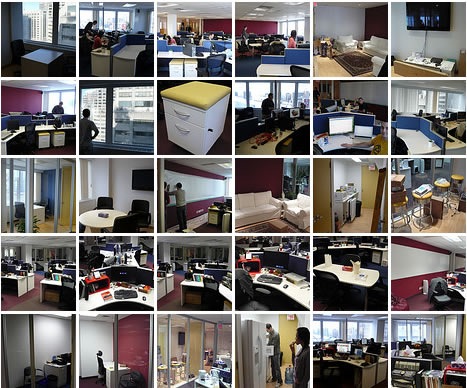
Click the montage to see the Flickr photoset.
Perhaps I’ll write about it at length someday, but for now a quick summary of what happened to this startup will have to suffice. They burned through money irresponsibly in many ways, including:
- Renting office space in a pricey office building in a posh boutique district of town. We were located between the Mont Blanc and Ports International stores and across the street from the downtown Four Seasons.
- Hiring an interior decorator to do a custom design of the office space, with custom furniture. I’d have kept the decent chairs, but we would’ve been just as productive with folding tables as we were with the custom desks.
- Purchasing two large flat-screen TVs, neither of which were ever used for business purposes. They were pretty great for Wii and Xbox 360 games, though.
- The ice sculpture and oyster shucker at the office-warming party. The party was black tie optional for some reason that still eludes me. At least they scaled down their ice sculpture purchase; they originally wanted the Chrysler Building, but settled for the less complex (and less expensive) company logo instead.
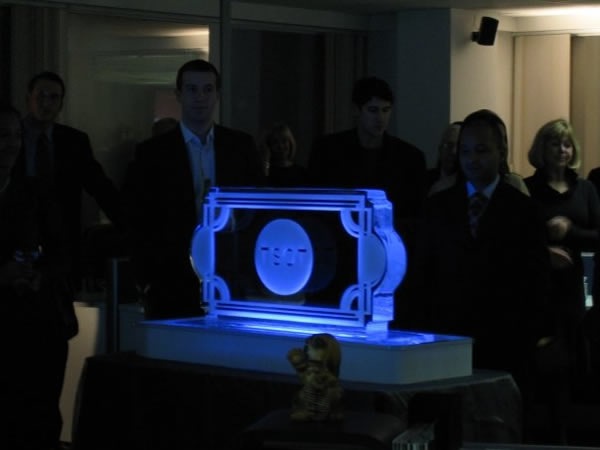
The ice sculpture at the office-warming party.
Alarmed at the company’s burn rate and lack of income, the source of the startup’s funding threatened to cut off the money. We were then informed by the CEO that unless we accelerated the schedule unreasonably, we’d all have to take a 20% pay cut. He went on vacation to Hawaii with his girlfriend a couple of days after that because he always went on vacation to Hawaii with his girlfriend at that time of year, crisis at his own company be damned.
While he was away, the entire senior developer team, of which I was part, started circulating their resumes and putting out the word that they were looking for new jobs. Within six weeks, the senior team had left the company. Within six months, the company had all but vanished. The website for the software no longer works, and the website for the company is now a single page showing the startup logo and nothing more.
My job at the startup, which had gone from dream to nightmare, lasted three months and a few days. The name of the startup still gets mentioned from time to time at local geek gatherings, sometimes as a cautionary tale, sometimes as a joke.
The Second Job (March 2008 – September 2008)
While searching around for jobs, I noticed that b5media was looking for a technical project manager. “b5”, as they’re often called, is a local startup success story, having grown from a small core of five bloggers and an office in Mark Evans’ garage to a network of over 300 blogs. I also knew that they’d landed funding thanks to meeting VC Rick Segal at DemoCamp, a semi-regular “show and tell” event for the Toronto tech community that I help host.
I showed up at b5media for an interview at 11:00 a.m. on one cold day in February, expecting a one-hour interview. It turned into a seven-hour series of multiple interviews with various people at the company, mostly testing me for how well I fit in with the office’s culture. I pretty much landed the job that day, and a couple of weeks later, I had my first day on the job, which involved flying down to Austin, Texas to attend the South by Southwest Interactive Festival for a week. I’d have to say that it was the best first week on the job I’ve ever had.
Regular readers of this blog know what happened in the end: changes in the market and at the company left me with nearly nothing to do, and they let me go…on the day of my wedding anniversary (they didn’t know that, but their timing still left something to be desired). I hold no ill will towards them; paying me to warm a chair does neither b5 nor me any good. It was the right thing to do, and they treated me quite well during the process.
Still, I felt like this:

The Job Search
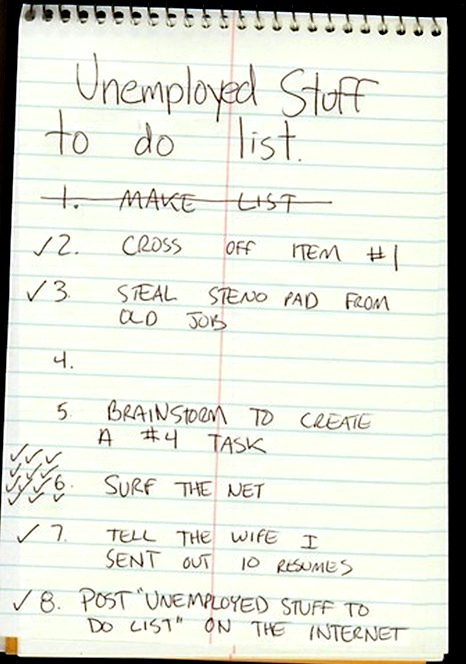
I decided to treat my getting laid off as an opportunity in disguise, a chance to explore all my options and do a little long-term career planning. At the same time, watching my old schoolmate Ali Velshi on CNN talking about the credit crunch and dealing with a worried wife meant that I should try to secure some income as quickly as I could.
I had one big thing working in my favour: nearly seven years’ worth of tech evangelism and seven years’ worth of blogging meant that I had a lot of what VC Howard Lindzon calls “social capital” in the bank. I did not have to go looking for job openings; they came looking for me. A number of people called, emailed, instant-messaged and tweeted me, asking if I’d be interested in working for their company and if I could make some time to meet them for an interview. The jobs ran the gamut from doing some development for an adult entertainment site to doing tech evangelism for some pretty high-profile companies. I did interviews with just about everyone who called me, which meant that I was actually busier as an unemployed man that I was during my last weeks at b5.
I even got a call from an editor at a very reputable book publisher in New York asking if I’d ever given any thought to writing a book. The answer, by the way, is “yes”, and as soon as an idea comes to me, I plan to fly down to Manhattan in a nice suit and do a pitch over cocktails, which if Mad Men is not lying to me, is how these things go.
Most of the companies who called were the type I’d always worked for: either startups or small operations where I’d have the ability to wear many hats, make a significant contribution and have a great degree of freedom. Medium to large companies were completely off my radar, but I’d have to say that it was mostly because I’d grown accustomed to thinking of myself as a small company man.
As a result, it seemed unreal when I got a number of calls from different people from the same organization, all asking variations on the same question:
“Have you ever considered joining The Empire?“
Imperial Considerations

I’ll be honest: I had some qualms about joining Microsoft.
Fear of “selling out” and working for a big company wasn’t even a factor. It probably should matter at 21, but not at 41. To borrow a saying often misattributed to Churchill: if you’re not at least a little liberal at 21, you have no heart; if you’re not at least a little conservative at 41, you have no brain.
There’s also the standing order from The Missus: “No more working for fucking under-30 CEOs!”
Finally, consider the great truth expressed in the comic below:
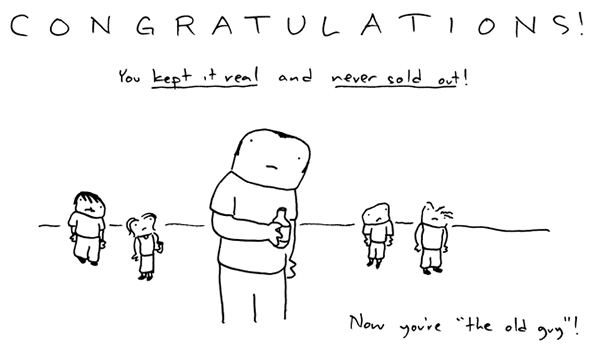
My qualms didn’t arise out of loyalty to Apple; they make some really nice machines and an excellent OS, but I’m not really one of those “It’s Apple or nothing” types. They also didn’t come from an “open source forever, Microsoft never!” feeling either. Open source has resulting in some great things happening, but once again, I’m not a “F/OSS or nothing” kind of guy, either.
My qualms came from the feeling that Microsoft had little to offer to me as a developer. Once upon a time, back when my friend Adam Smith and I had a little software development constancy, Microsoft was my friend. From the mid-1990s to the release of .NET 1.0, it felt as if they were constantly reaching out to developers. Then somewhere along the way, at around the same time as the rise of web applications, Apache, PHP and later things like Rails and Django, something happened. Microsoft had apparently switched their focus away from developers and towards the suits – the decision-makers who approved the tech purchases, rather than the people who actually had to live with the decisions. I’m sure that many developers felt the same way I did: Microsoft slowly faded from my radar because it seemed as if I’d faded from theirs.
I think that my friend Danny O’Brien expressed this best when he wrote:
One of my big bones with MS stuff is that it always makes me feel like I’m eating out of the trash bins outside a cubicle farm. All of their software is designed to help busy executives plan their lives. Everyone I know uses it to try and write birthday cards and chat with their friends. When people use Microsoft Office they use it anywhere but in an office. Microsoft knows this – but it also knows that the money comes from their corporate clients, so there’s a limit to how much it can bend its software toward a wider customer base. Ultimately when you use MS software, you’re not the end user MS perceives at all: we’re just living off the scraps Microsoft leaves out after feeding its big customers.
One thing that convinced me to join Microsoft was a small-seeming but important sense of a “sea change” at Microsoft.
Perhaps it was their hiring of some people I’d never expect: David Crow (I’ll admit that I was ready to bet some good money on his leaving within six months, saying “It’ll either end in tears…or gunfire”), Bryce Johnson, John Lam and Danah Boyd.
It might have been their willingness to even consider talking to me after my posting this graphic on my blog:
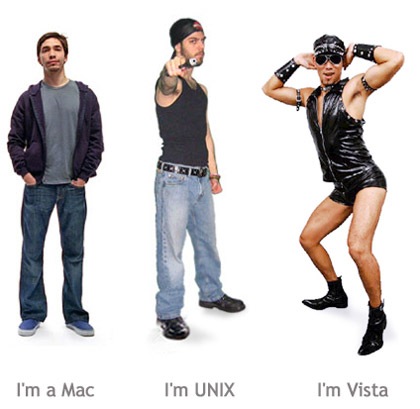
It might have been some very lengthy conversations I had with friends who worked at Microsoft.
It might have been this thing:

I won an XBox 360 at the 2006 Boston Ajax Experience conference, and I was surprised at how much I loved it. It doesn’t feel like a “Microsoft product” – it feels like something built by people who love games for people who love games. The “Less Hulk, More Bruce Lee” story behind the design of the XBox 360 that Jean-Luc David told me probably helped as well.

What probably convinced me most was the opportunity to work for a couple of great people who believed in me, Mark Relph and John Oxley. They offered the combination of a lot of support and a great deal of latitude, the ability to work largely from the home office and most importantly, the freedom to inject my own personal style into the work I’d do. I think Mark’s line, “We enter as friends, we leave as friends”, struck a chord with me.
At the end of my sixth(!) interview, John said “We’d like to take you on. Are you interested?”
I replied “To quote Homer Simpson, I have only two questions: ‘How much?’ and ‘Give it to me!’”
In the end, I was unemployed for a grand total of three weeks. Considered the economic collapse taking place all ‘round, that’s not bad at all.
Fry-Kirk Syndrome (or: The Third Job; October 2008 – Present)

At the dawn of 2009, just over a year after leaving my tech evangelist job, I have escaped from one imploding company, been laid off from a downsizing one and finally ended up at a job that fits me like a glove. After this journey, I have become…a tech evangelist.
I feel like “Fry” from Space Pilot 3000, the premiere episode of Futurama. Fry, a p[izza delivery boy in 1999, is frozen on New Year’s Eve 1999 and revived a thousand ears later. In the year 3000, a computer determines that he is best-suited to being a delivery boy, and he spends much of the episode trying to escape this fate. In the end, he cheers as he finds work with a distant relative…as a delivery boy.
Captain Kirk had a similar experience: he always returned to his first, best destiny – being captain of the Enterprise. I feel that I’ve managed to do the same, and with the added bonus of not having a court martial, blowing up the ship, losing my son and getting demoted from Admiral.
Like the young man in the “Bottle Rocket” video near the start of this essay, I took some risks and got a little singed in the process. But as Charles Follymacher also pointed out, sometimes you “manage to live to tell the tale and, wherever possible, wreak [sic] the profits,” and that’s what happened to me in the end.
As any decent poker player will tell you, winning isn’t in the cards you’re dealt, but how you play them. In spite of all the craziness this year, I did quite well.
I’m looking forward to 2009.
[This article also appears in The Adventures of Accordion Guy in the 21st Century.]
3 replies on “2008: Annus Assrocketis (The Year of Assrockets)”
Great post, Joey! Thoroughly entertaining and interesting, from beginning to end. Thanks for telling the story.
It’s been a surprisingly assrocket year for a lot of us.. I think it was Oscar Wilde who said: “If you never lie in the gutter with a rocket in your ass then you’ll never see stars.”
[…] Image credit: globalnerdy […]